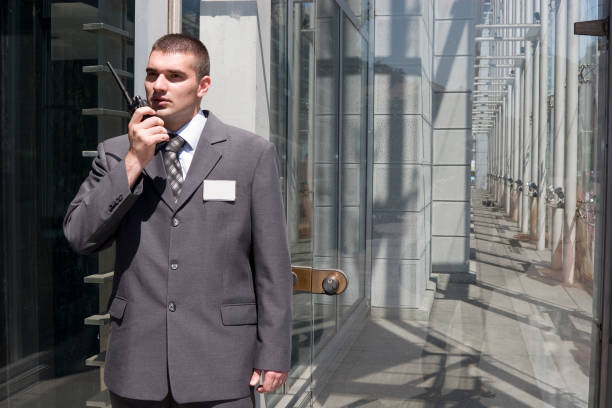Security remains one of the UK’s most stable and rapidly expanding industries. Completing your SIA Door Supervisor training is a key milestone that opens multiple doors in this thriving field. Far from being limited to nightclub or event security, the qualification provides a foundation for long-term professional growth across various environments such as corporate offices, construction sites, festivals, and retail outlets.
For those aiming to build a meaningful career in security, understanding your opportunities after earning the SIA licence is crucial. This guide explains the top five career paths after SIA Door Supervisor training, highlighting responsibilities, salary expectations, promotion prospects, and the overall industry demand for each role.
Understanding SIA Door Supervisor Training
To work legally in private security within the UK, professionals must hold a valid licence from the Security Industry Authority (SIA). The SIA Door Supervisor training course prepares individuals to manage security roles in public venues, events, and workplaces by providing both theoretical and practical knowledge.
Training typically covers:
- Conflict management and de-escalation
- Physical intervention and restraint techniques
- Emergency and evacuation procedures
- Customer service and professional communication
- Legal responsibilities and incident reporting
Completing this course demonstrates professionalism, reliability, and competency in safety management. Training institutions such as JFK Tech provide accredited courses designed to meet national SIA standards and ensure learners gain the confidence to perform effectively in real-world situations.
Why Choose a Career After SIA Door Supervisor Training?
The UK’s security sector employs hundreds of thousands of professionals across multiple industries. From retail stores to government facilities, every business requires reliable security measures to ensure safety and compliance.
According to recent statistics:
- There are over 400,000 active SIA licence holders across the UK.
- The demand for security personnel has increased by 15% annually due to event expansion and new construction projects.
- The industry offers both full-time stability and flexible work schedules, catering to different lifestyles.
Unlike many professions, security provides a structured career ladder with clear pathways for promotion. Whether your goal is to move into management, training, or specialised protection services, your Door Supervisor licence is the essential first step.
Top 5 Career Paths After SIA Door Supervisor Training
After completing your SIA Door Supervisor training, you’ll find several career options that align with your experience, personality, and long-term ambitions. Below are the five most promising and profitable routes available.
1. Door Supervisor (Entry-Level Role)
The most common starting point is working as a Door Supervisor in entertainment venues, bars, or nightclubs. These professionals maintain order, manage entry, and ensure that customers enjoy a safe environment.
Key Responsibilities:
- Checking identification and managing venue entry
- Monitoring crowd behaviour and preventing disorder
- Handling conflicts calmly and professionally
- Responding to emergencies and reporting incidents
Average Salary: £22,000 – £30,000 per year
Industry Demand: High, particularly in urban centres and hospitality venues.
This role is more than security at the door — it involves safeguarding people, enforcing rules, and ensuring compliance with licensing laws. Successful Door Supervisors often become trusted figures within their communities and employers, paving the way for future promotions.
2. Security Officer
After gaining experience, many professionals transition to Security Officer positions. These roles are often based in office buildings, hospitals, retail environments, or corporate facilities where maintaining access control and asset protection is vital.
Key Responsibilities:
- Monitoring CCTV and alarm systems
- Patrolling premises to deter theft or vandalism
- Controlling access and verifying credentials
- Responding to security breaches or emergencies
Average Salary: £25,000 – £32,000 per year
Promotion Prospect: Strong, with opportunities to progress to senior officer or site supervisor positions.
Security officers are essential for loss prevention and maintaining workplace safety. This position offers more regular working hours compared to door supervision and provides opportunities for specialisation in fields such as logistics or healthcare security.
3. Event Security and Crowd Management
For those who enjoy dynamic and high-energy environments, event security is an excellent choice. Major concerts, sports events, and public festivals all require well-trained teams to ensure safety for large crowds.
Key Responsibilities:
- Overseeing crowd flow and controlling entry points
- Assisting with emergency evacuations
- Ensuring compliance with health and safety regulations
- Providing customer service to attendees and staff
Average Salary: £24,000 – £35,000 per year
Industry Demand: Seasonal but consistent, especially during summer and holiday periods.
Event security allows professionals to work in exciting environments, travel across the UK, and collaborate with diverse teams. It’s also a gateway into managerial positions such as Event Operations Manager or Security Team Leader.
4. Close Protection and VIP Security
Once you have several years of experience and additional qualifications, Close Protection can become a lucrative and respected career path. Close Protection Officers (CPOs) provide personal security for high-profile individuals, executives, and celebrities.
Key Responsibilities:
- Conducting threat and risk assessments
- Planning secure transport and venue routes
- Monitoring environments for potential hazards
- Coordinating with law enforcement or private teams
Average Salary: £35,000 – £65,000 per year
Promotion Prospect: Exceptional, with potential to work internationally.
Close Protection roles demand professionalism, physical fitness, and discretion. The training required is more specialised, but the financial rewards and career satisfaction are substantial for those seeking an advanced role beyond standard door supervision.
5. Security Management and Training Roles
After gaining years of field experience, many professionals move into Security Management or Training. These senior positions focus on leadership, compliance, and skill development across teams and organisations.
Key Responsibilities:
- Managing staff schedules and site security operations
- Conducting internal audits and policy reviews
- Designing safety procedures and risk mitigation strategies
- Training new recruits and mentoring team members
Average Salary: £40,000 – £70,000 per year
Industry Demand: Growing rapidly, especially within large corporations and training academies.
Training providers often hire experienced professionals who shift from active security work to educational roles, helping others succeed in the field. These positions require strong organisational skills, leadership, and an understanding of both security operations and human behaviour.
Career Comparison After SIA Door Supervisor Training
| Career Path | Average Salary (Per Year) | Growth Potential | Typical Work Environment |
| Door Supervisor | £22,000 – £30,000 | Medium | Bars, clubs, events |
| Security Officer | £25,000 – £32,000 | High | Corporate, retail, residential |
| Event Security | £24,000 – £35,000 | Seasonal | Festivals, concerts, sports |
| Close Protection | £35,000 – £65,000 | Very High | VIP, executive, travel |
| Security Management/Training | £40,000 – £70,000 | High | Office, training centres |
Promotion Prospects and Long-Term Growth
Career advancement in the security sector depends on experience, reliability, and continuous learning. Supervisors often progress into team leadership, operations management, or corporate compliance roles.
Many professionals also transition to specialist sectors such as transportation security, CCTV monitoring, or cyber protection, expanding their earning potential.
Employers prefer candidates with updated SIA certifications and additional skills like first aid, advanced restraint, or leadership training. Continuous development ensures career longevity and higher earning power.
Salary Expectations and Regional Variations
While pay varies depending on experience, qualifications, and location, the security industry remains competitive.
General salary ranges:
- Entry-level door supervisors: £11–£13 per hour
- Experienced officers: £14–£18 per hour
- Close Protection professionals: £250–£400 per day
Metropolitan areas such as London, Manchester, and Birmingham often pay more due to higher risk and cost of living. Rural regions may offer lower pay but provide consistent schedules and less stressful environments.
Industry Demand and Future Outlook
The demand for trained security personnel continues to grow across the UK. Factors contributing to this rise include:
- Expanding nightlife and entertainment industries
- Increased focus on workplace safety regulations
- Growth in construction, logistics, and healthcare sectors
Technological advancements also shape the future of the industry. Professionals familiar with digital surveillance, biometric access systems, and AI monitoring tools will remain highly sought after.
Training and Continuous Professional Development
Maintaining an active SIA licence requires renewal every three years, ensuring professionals remain up to date with legal requirements and safety standards.
To advance, consider pursuing additional certifications such as:
- SIA CCTV Operator Course
- First Aid at Work
- Conflict Resolution and Management
Training providers offer accessible learning options, enabling working professionals to enhance their credentials and remain competitive in the job market.
Final Thought
Completing your SIA Door Supervisor training is not just a step into employment — it’s the beginning of a rewarding and stable career. Whether you prefer working directly with the public, managing operations, or training others, there are countless opportunities for professional and personal growth.
With dedication, continued learning, and the right qualifications, you can progress from entry-level supervision to leadership and specialist roles.
To learn more about accredited training programmes or to explore advanced SIA courses, contact us today for guidance on achieving your career goals in the UK security industry.
Frequently Asked Questions
1. What jobs can I get after completing SIA Door Supervisor training?
You can work as a door supervisor, event security officer, or corporate security guard. With experience, you can advance to management or specialist protection roles.
2. How long does an SIA Door Supervisor licence last?
The licence is valid for three years and must be renewed before it expires to continue working legally in security roles.
3. Can I work as a security officer with a Door Supervisor licence?
Yes, this licence allows you to work in most security positions, including door supervision and general guarding, except for roles requiring specific CCTV or Close Protection training.
4. What kind of salary can I expect in the security industry?
Salaries vary depending on role and experience. Entry-level supervisors earn around £11–£13 per hour, while management and Close Protection roles offer higher pay.
5. Where can I get recognised SIA Door Supervisor training?
Accredited institutions offer certified courses aligned with SIA standards to prepare you for a successful career in the UK security sector.



